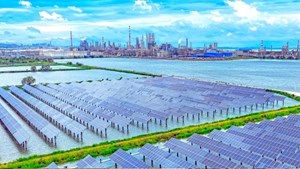News
China's factory-based seawater H2 production project completed at Sinopec Qingdao Refinery
China Petroleum & Chemical Corporation's (Sinopec) completes China's first factory-based seawater H2 production research project at its Qingdao Refinery. The project integrates direct seawater electrolysis with renewable energy-powered green H2 production, achieving an hourly output of 20 cubic meters of green H2. This innovative approach not only offers a new solution for coastal regions to utilize renewable energy for green H2 production but also provides an alternative pathway for the resourceful utilization of high-salinity industrial wastewater.
The project adopts a factory-based operation model, leveraging part of the green electricity generated from Qingdao Refinery's floating photovoltaic power station. Through electrolysis, seawater is split into H2 and oxygen, with the produced H2 seamlessly integrated into the Qingdao Refinery's pipeline network for use in refining processes or H2-powered vehicles. The entire production process occurs within a factory setting, ensuring efficiency and operational stability.
Seawater H2 production holds significant potential. By directly converting seawater into H2, unstable and hard-to-store renewable energy can be transformed into green H2, which is relatively easier to store and utilize. Moreover, this process conserves precious freshwater resources, offering a new pathway for the development of the H2 energy industry.
Despite its advantages, seawater H2 production comes with challenges. Seawater contains approximately 3% salt, and impurities, such as chloride ions, can corrode electrolytic electrodes, while cation deposits may clog equipment channels, reducing efficiency and causing damage. Sinopec Qingdao Refinery, in collaboration with the Dalian Institute of Petroleum and Petrochemicals, has successfully overcome these challenges through a series of specialized equipment innovations and unique process designs, including chlorine-resistant electrode technology, high-performance electrode plate design, and a seawater circulation system, enabling a seamless integration of research and practical applications.
Seawater H2 production is expected to achieve large-scale industrial applications in the future. Sinopec is accelerating its efforts to become China's leading H2 energy company by advancing the research and application of H2 technologies across the entire industry chain.
Sinopec has already achieved several milestones, including the successful deployment of a megawatt-scale PEM electrolyzer and the commissioning of China's first 100-kilowatt solid oxide electrolysis cell (SOEC) project. By 2024, the company has established 136 H2 refueling stations, and built 11 H2 fuel supply centers, underscoring its commitment to driving high-quality growth in the H2 energy sector.


